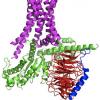"Our immune response against a foreign molecule present in animal products may play a role in some allergic, autoimmune, and inflammatory disorders. This reaction is thought to underlie tick bite triggered meat allergies."
- igf-1
- Neu5Gc
- sialic acid
- alpha-gal
What are your thoughts? Check out the video linked just bellow.
Sources Cited
A Kutlu, S Oztürk, O Taşkapan, Y Onem, MZ Kiralp, L Ozcakar. Meat-induced joint attacks, or meat attacks the joint: Rheumatism versus allergy. Nutr Clin Pract. 2010 25(1):90 – 91.
U Galili, EA Rachmilewitz, A Peleg, I Flechner. A unique natural human IgG antibody with anti-alpha-galactosyl specificity. J Exp Med. 1984 160(5):1519 – 1531.
A Thall, U Galili. Distribution of Gal alpha 1----3Gal beta 1----4GlcNAc residues on secreted mammalian glycoproteins (thyroglobulin, fibrinogen, and immunoglobulin G) as measured by a sensitive solid-phase radioimmunoassay. Biochemistry. 1990 29(16):3959 – 3965.
U Galili. Interaction of the natural anti-Gal antibody with alpha-galactosyl epitopes: A major obstacle for xenotransplantation in humans. Immunol Today. 1993 14(10):480 – 482.
DKC Cooper. Identification of alpha Gal as the major target for human anti-pig antibodies. Xenotransplantation. 2009 16(1):47 – 49.
M Morisset, C Richard, C Astier, S Jacquenet, A Croizier, E Beaudouin, V Cordebar, F Morel-Codreanu, N Petit, DA Moneret-Vautrin, G Kanny. Anaphylaxis to pork kidney is related to IgE antibodies specific for galactose-alpha-1,3-galactose. Allergy. 2012 67(5):699 – 704.
SP Commins, HR James, LA Kelly, SL Pochan, LJ Workman, MS Perzanowski, KM Kocan, JV Fahy, LW Nganga, E Ronmark, PJ Cooper, TAE. Platts-Mills. The relevance of tick bites to the production of IgE antibodies to the mammalian oligosaccharide galactose-alpha-1,3-galactose. J Allergy Clin Immunol. 2011 127(5):1286– 93.
SP Commins, TAE Platts-Mills. Delayed anaphylaxis to red meat in patients with IgE specific for galactose alpha-1,3-galactose (alpha-gal). Curr Allergy Asthma Rep. 2013 13(1):72 – 77.
National Center for Emerging and Zoonotic Infectious Diseases. Amblyomma americanum tick. 2010.
HM Feder Jr, DM Hoss, L Zemel, SR Telford 3rd, F. Dias, G. P. Wormser. Southern Tick-Associated Rash Illness (STARI) in the North: STARI following a tick bite in Long Island, New York. Clin Infect Dis. 2011 53(10):e142 – 6.
SP Commins, SM Satinover, J Hosen, J Mozena, L Borish, BD Lewis, JA Woodfolk, TAE Platts-Mills. Delayed anaphylaxis, angioedema, or urticaria after consumption of red meat in patients with IgE antibodies specific for galactose-a-1,3-galactose. J Allergy Clin Immunol. 2009 123(2):426-33.
SA Van Nunen, KS O'Connor, LR Clarke, RX Boyle, SL Fernando. An association between tick bite reactions and red meat allergy in humans. Med J Aust. 2009 190(9):510 – 511.
CV Hartig, GW Haller, DH Sachs, S Kuhlenschmidt, PS Heeger. Naturally developing memory T cell xenoreactivity to swine antigens in human peripheral blood lymphocytes. J Immunol. 2000 164(5):2790 – 2796.
DE Mosedale, A Chauhan, PM Schofield, DJ Grainger. A pattern of anti-carbohydrate antibody responses present in patients with advanced atherosclerosis. J Immunol Methods. 2006 309(1 - 2):182 – 191.
A Mangold, D Lebherz, P Papay, J Liepert, G Hlavin, C Lichtenberger, A Adami, M Zimmermann, D Klaus, W Reinisch, HJ Ankersmit. Anti-Gal titers in healthy adults and inflammatory bowel disease patients. Transplant Proc. 2011 43(10):3964 – 3968.
MS Sandrin, HA Vaughan, PX Xing, IF McKenzie. Natural human anti-Gal alpha(1,3)Gal antibodies react with human mucin peptides. Glycoconj J. 1997 14(1):97 – 105.
L Gollogly, V Castronovo. A possible role for the alpha 1-->3 galactosyl epitope and the natural anti-gal antibody in oncogenesis. Neoplasma. 1996 43(5):285 – 289.
M Mayr, D Grainger, U Mayr, AS Leroyer, G Leseche, A Sidibe, O Herbin, X Yin, A Gomes, B Madhu, JR Griffiths, Q Xu, A Tedgui, CM Boulanger. Proteomics, metabolomics, and immunomics on microparticles derived from human atherosclerotic plaques. Circ Cardiovasc Genet. 2009 2(4):379 – 388.
RJ Winand, JW Devigne, M Meurisse, U Galili. Specific Stimulation of Graves’ Disease thyrocytes by the natural anti-Gal Antibody from normal and autologous serum. J Immun. 1994 153(3):1386-1395.
EJ Masters, CN Grigery, RW Masters. STARI, or Masters Disease: Lone Star tick-vectored Lyme-like Illness. Infect Dis Clin N Am. 2008 22(2):361–376.
Sources Cited
A. 't Mannetje, A. Eng, N. Pearce. Farming, growing up on a farm, and haematological cancer mortality. Occup Environ Med 2012 69(2):126 - 132.
K.-M. Choi, E. S. Johnson. Occupational exposure assessment using antibody levels: Exposure to avian leukosis/sarcoma viruses in the poultry industry. Int J Environ Health Res 2011 21(4):306 - 316.
K.-M. Choi, E. S. Johnson. Industrial hygiene assessment of reticuloendotheliosis viruses exposure in the poultry industry. Int Arch Occup Environ Health 2011 84(4):375 - 382.
D. Neasham, A. Sifi, K. R. Nielsen, K. Overvad, O. Raaschou-Nielsen, A. Tjonneland, A. Barricarte, C. A. González, C. Navarro, L. R. Suarez, R. C. Travis, T. Key, J. Linseisen, R. Kaaks, P. Crosignani, F. Berrino, S. Rosso, A. Mattiello, R. C. H. Vermeulen, H. B. Bueno-de-Mesquita, G. Berglund, J. Manjer, S. Zackrisson, G. Hallmans, B. Malmer, S. Bingham, K. T. Khaw, M. M. Bergmann, H. Boeing, A. Trichopoulou, G. Masala, R. Tumino, E. Lund, N. Slimani, P. Ferrari, P. Boffetta, P. Vineis, E. Riboli. Occupation and risk of lymphoma: A multicentre prospective cohort study (EPIC). Occup Environ Med 2011 68(1):77 - 81.
E. S. Johnson, H. Ndetan, M. J. Felini, M. F. Faramawi, K. P. Singh, K.-M. Choi, R. Qualls-Hampton. Mortality in workers employed in pig abattoirs and processing plants. Environ. Res. 2011 111(6):871 - 876.
S. R. Jónsson, R. S. LaRue, M. D. Stenglein, S. C. Fahrenkrug, V. Andrésdóttir, R. S. Harris. The restriction of zoonotic PERV transmission by human APOBEC3G. PLoS ONE 2007 2(9):e893
Y. Takeuchi, J. Fishman. Long life with or without PERV. Xenotransplantation 2010 17(6):429 - 430.
S. M. Holzbauer, A. S. DeVries, J. J. Sejvar, C. H. Lees, J. Adjemian, J. H. McQuiston, C. Medus, C. A. Lexau, J. R. Harris, S. E. Recuenco, E. D. Belay, J. F. Howell, B. F. Buss, M. Hornig, J. D. Gibbins, S. E. Brueck, K. E. Smith, R. N. Danila, W. I. Lipkin, D. H. Lachance, P. J. B. Dyck, R. Lynfield. Epidemiologic investigation of immune-mediated polyradiculoneuropathy among abattoir workers exposed to porcine brain. PLoS ONE 2010 5(3):e9782.
M. Lotti, L. Bergamo, B. Murer. Occupational toxicology of asbestos-related malignancies. Clin Toxicol (Phila) 2010 48(6):485 - 496.
M. Felini, E. Johnson, N. Preacely, V. Sarda, H. Ndetan, S. Bangara. A pilot case-cohort study of liver and pancreatic cancers in poultry workers. Ann Epidemiol 2011 21(10):755 - 766.
S. M. Lynch, A. Vrieling, J. H. Lubin, P. Kraft, J. B. Mendelsohn, P. Hartge, F. Canzian, E. Steplowski, A. A. Arslan, M. Gross, K. Helzlsouer, E. J. Jacobs, A. LaCroix, G. Petersen, W. Zheng, D. Albanes, L. Amundadottir, S. A. Bingham, P. Boffetta, M.-C. Boutron-Ruault, S. J. Chanock, S. Clipp, R. N. Hoover, K. Jacobs, K. C. Johnson, C. Kooperberg, J. Luo, C. Messina, D. Palli, A. V. Patel, E. Riboli, X.-O. Shu, L. R. Suarez, G. Thomas, A. Tjonneland, G. S. Tobias, E. Tong, D. Trichopoulos, J. Virtamo, W. Ye, K. Yu, A. Zeleniuch-Jacquette, H. B. Bueno-de-Mesquita, R. Z. Stolzenberg-Solomon. Cigarette smoking and pancreatic cancer: A pooled analysis from the pancreatic cancer cohort consortium. Am. J. Epidemiol. 2009 170(4):403 - 413.
J.-M. Yuan, S. Govindarajan, K. Arakawa, M. C. Yu. Synergism of alcohol, diabetes, and viral hepatitis on the risk of hepatocellular carcinoma in blacks and whites in the U.S. Cancer 2004 101(5):1009 - 1017.
E. S. Johnson, M. F. Faramawi, M. Sall, K.-M. Choi. Cancer and noncancer mortality among American seafood workers. J Epidemiol 2011 21(3):204 - 210.
M. Marvisi, L. Balzarini, C. Mancini, P. Mouzakiti. A new type of Hypersensitivity Pneumonitis: Salami brusher's disease. Monaldi Arch Chest Dis 2012 77(1):35 - 37.
R. Weiner, D. Rees, F. J. Lunga, M. A. Felix. Third wave of asbestos-related disease from secondary use of asbestos. A case report from industry. S. Afr. Med. J. 1994 84(3):158 - 160.
D. H. Lachance, V. A. Lennon, S. J. Pittock, J. A. Tracy, K. N. Krecke, K. K. Amrami, E. M. Poeschla, R. Orenstein, B. W. Scheithauer, J. J. Sejvar, S. Holzbauer, A. S. Devries, P. J. B. Dyck. An outbreak of neurological autoimmunity with polyradiculoneuropathy in workers exposed to aerosolised porcine neural tissue: A descriptive study. Lancet Neurol 2010 9(1):55 - 66.
J. A. Tracy, P. J. B. Dyck. Auto-immune polyradiculoneuropathy and a novel IgG biomarker in workers exposed to aerosolized porcine brain. J. Peripher. Nerv. Syst. 2011 16 (Suppl 1):34 - 37
L. Proietti, L. Spicuzza, A. Di Maria, R. Polosa, E. S. Torres, V. Asero, G. U. Di Maria. Non-occupational malignant pleural mesothelioma due to asbestos and non-asbestos fibres. Monaldi Arch Chest Dis 2006 65(4):210 - 216.
E. S. Johnson, H. Ndetan, K. M. Lo. Cancer mortality in poultry slaughtering/processing plant workers belonging to a union pension fund. Environ Res. 2010 110(6):588-594.
X. J. Meng. Emerging and Re-emerging Swine Viruses. Transbound Emerg Dis. 2012 Jan 9.
T. M. Deangelis, L. Shen. Outbreak of progressive inflammatory neuropathy following exposure to aerosolized porcine neural tissue. Mt Sinai J Med. 2009 76(5):442-447.
J. Z. Adjemian, J. Howell, S. Holzbauer, J. Harris, S. Recuenco, J. McQuiston, T. Chester, R. Lynfield, A. Devries, E. Belay, J. Sejvar. A clustering of immune-mediated polyradiculoneuropathy among swine abattoir workers exposed to aerosolized porcine brains, Indiana, United States. Int J Occup Environ Health. 2009 15(4):331-338.
M. Greenberg. Swine abattoir workers exposed to aerosolized porcine brains: will we ever learn? Int J Occup Environ Health. 2010 16(1):101.
Kutlu A, Oztürk S, Taşkapan O, Onem Y, Kiralp MZ, Ozçakar L. Meat-induced joint attacks, or meat attacks the joint: rheumatism versus allergy. Nutr Clin Pract. 2010 Feb;25(1):90-1.
Edited by Phoenicis, 16 May 2014 - 01:25 PM.




















































